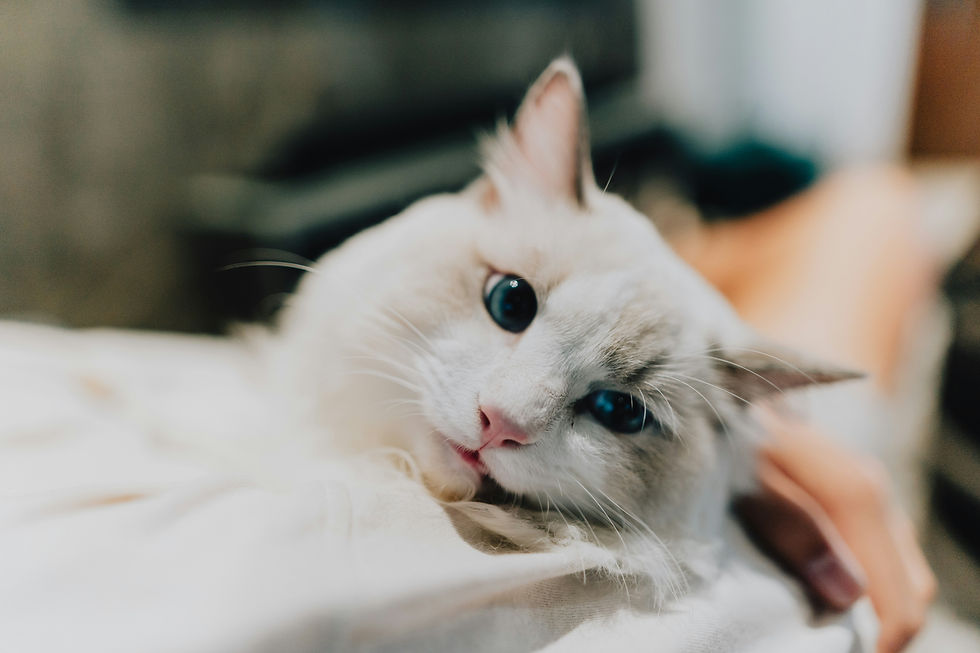Can Cats Fully Recover from FIP? A 12-Week Guide After Treatment
- CURE FIP™ USA

- Oct 5, 2025
- 3 min read
Feline Infectious Peritonitis (FIP) was once considered an untreatable and fatal condition in cats. Today, with the introduction of antiviral therapy like GS-441524, thousands of cats around the world—including many here in the United States—have not only survived FIP but gone on to live long, healthy lives.

However, finishing the standard 84-day treatment does not mark the end of the journey. Cats must enter a 12-week observation period to confirm full recovery and to ensure relapse does not occur.
At CureFIP US, our mission is to give cat parents the knowledge and tools they need for this critical stage.
What Is the Observation Period?
The observation period refers to the 12 weeks following treatment, when your cat must be carefully monitored.
Even if symptoms disappear and blood test results improve, relapse remains a possibility. That’s why veterinarians and FIP specialists emphasize consistent monitoring during this period.
📖 Read more: The First Week of FIP Treatment: What to Expect
The 12-Week Timeline
During this time, combine daily at-home checks with scheduled veterinary tests:
Day 30 – First blood test: evaluate liver, kidney, and protein levels.
Day 60 – Second blood test: confirm stability and rule out hidden inflammation.
Day 84 (end of treatment) – Third blood test: final evaluation before moving into full observation.
👉 At home: record your cat’s appetite, weight, energy level, and body temperature daily.
📖 Related: How Long Can a Cat Live with FIP?
Positive Signs of Recovery
Healthy indicators during observation include:
Normal appetite – eating consistently without fuss.
Steady weight gain – 0.2–0.4 lbs (100–200 g) per week in adult cats.
Increased energy – active, playful, grooming, and socially engaged.
Stable body temperature – no recurring fevers.
Consistent bloodwork – healthy liver, kidney, and protein values.
No fluid buildup – abdomen and chest remain clear.
The more positive signs you see, the higher the chance of full recovery.
Red Flags: Signs of Relapse
Relapse can still occur, even if your cat looks healthy. Contact your veterinarian if you notice:
Sudden loss of appetite
Rapid or unexplained weight loss
Fever returning or fluctuating body temperature
Weakness, lethargy, or excessive sleep
Fluid in the chest or abdomen
Neurological issues (seizures, wobbliness, sudden blindness)
Ocular issues (cloudy or inflamed eyes)
📖 Read also: Comprehensive FIP Treatment Guidelines
How to Support Your Cat During Observation
Nutrition
Provide high-quality, protein-rich meals.
Avoid raw diets that may introduce bacteria or parasites.
Environment
Reduce stress with a quiet, stable home routine.
Offer warmth, comfort, and gentle enrichment.
Daily Monitoring
Track weight, appetite, energy, and temperature every day.
Hygiene
Clean the litter box frequently.
Minimize interaction with other cats to reduce FCoV risk.
Veterinary Care
Keep scheduled blood tests at days 30, 60, and 84.
Monitor liver and kidney function closely.
Conclusion
Can cats fully recover from FIP? Yes. Thousands of cats—including many in the US—have proven that complete recovery is possible with GS-441524 therapy. But the 12-week observation period is vital. If your cat remains symptom-free, active, and stable through this stage, relapse risk is very low.
As a cat parent, your role is to stay consistent: monitor daily, provide optimal care, and respond quickly to any red flags. With discipline and love, recovery from FIP is no longer a rare miracle—it’s a growing reality.
FAQ
Q: Can cats in the US fully recover from FIP?
Yes. With GS-441524 treatment, many US cats have made complete recoveries.
Q: How long is the observation period?
12 weeks, with key blood tests at days 30, 60, and 84.
Q: What are signs of healthy recovery?
Normal appetite, steady weight gain, active behavior, no fever, and stable bloodwork.
Q: What are relapse signs?
Loss of appetite, recurring fever, weight loss, fluid buildup, or neurological/ocular symptoms.
Q: What should I do if my cat shows relapse signs?
Call your veterinarian immediately. Additional treatment may be needed.




Comments